

Was Occupy Wall Street just a dream? The fall of 2011 was one of the most exciting and optimistic times of my life as a progressive. Seeing thousands of young people all over the country flock to their local occupations was truly amazing and historic. I felt that we were in the middle of a cultural awakening and that a huge radical change was just on the brink.
The other weekend I went to New York City to see where it all began up close and in person. I walked to Wall Street to find Zuccotti Park and literally walked right past it. Quite naively I expected a huge space with progressive activists still meeting and planning the revolution, but found no one. In fact, Zuccotti Park is a tiny little plaza where tourists rest after visiting Ground Zero and taking pictures of the Wall Street bull sculpture. On the subway back to my friend’s house,
» Read more about: Zuccotti Park Blues: Occupy Wall Street Reconsidered »
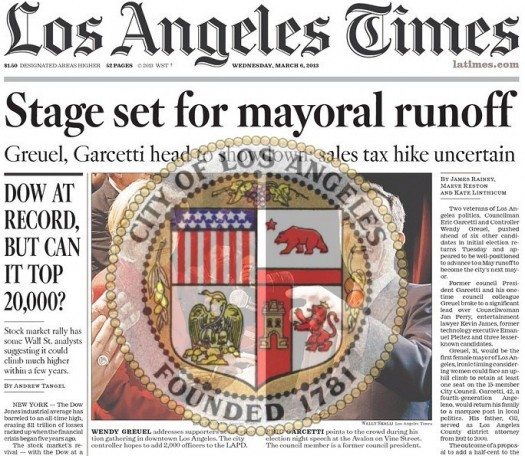
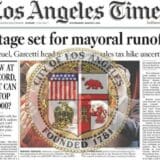
(Raphael “Raphe” Sonenshein is executive director of the Edmund G. “Pat” Brown Institute of Public Affairs and has headed charter-reform and neighborhood council review commissions. A California State University political science professor, Sonenshein is also an author whose books have analyzed racial and reform politics. He spoke to Frying Pan News about what he believes are the biggest tasks facing L.A.’s next mayor – as well as telling reporter Marc Haefele what candidates Eric Garcetti and Wendy Greuel should avoid during the campaign before the May 21 runoff election.)
The Biggest Job
The next mayor has to reinvent his office as an office of strength, because just being elected doesn’t hand you that. Once you are in you will be dealing with very powerful forces of the community and very powerful forces at City Hall —
» Read more about: Raphe Sonenshein’s Advice to Garcetti and Greuel »
The White House and prominent Democrats are talking about reducing future Social Security payments by using a formula for adjusting for inflation that’s stingier than the current one. It’s called the “Chained CPI.” I did this video so you can understand it — and understand why it’s so wrongheaded.
Even Social Security’s current inflation adjustment understates the true impact of inflation on the elderly. That’s because they spend 20 to 40 percent of their incomes on health care, and health-care costs have been rising faster than inflation. So why adopt a new inflation adjustment that’s even stingier than the current one?
Social Security benefits are already meager for most recipients. The median income of Americans over 65 is less than $20,000 a year. Nearly 70 percent of them depend on Social Security for more than half of this. The average Social Security benefit is less than $15,000 a year.
Besides,
» Read more about: Robert Reich: Don’t “Chain” Social Security »


I have been humming one of my favorite Elvis Costello songs from the moment I heard the news of Margaret Thatcher’s death Monday morning. The chorus never fails to move me:
“When they finally put you in the ground,
I’ll stand there laughing, and tramp the dirt down.”
A friend forwarded me some other excellent Thatcher songs, and I spent last night on a truly enjoyable trip down Memory Lane.
The songs and videos gathered include Costello’s, along with Billy Bragg’s, and the Specials’ “Ghost Town” – which was the soundtrack to a summer spent in London when I was 14 — and more hardcore offerings. Perhaps Thatcher’s one positive legacy is the inspiration she provided to punk rock. I remember the kind of ecstatic anger I felt listening to some of those bands – and Thatcher was an excellent focus for that anger.


“I remember my Mom’s heartbreak when she could not afford to give my younger brother the treatment he needed when we learned he had a hip disease,” the man said. “It was my Mom – the wife of a WWII veteran — who taught me something I still believe today: This country is the greatest in the world. America’s greatness is largely because of how we value the weakest among us. Quality healthcare services must be accessible and affordable for all – not just those in certain ZIP codes or tax brackets.”
That’s music to the ears of progressives, maybe even Top-40ish in its soothing, harmonious familiarity. The dissonant note is who actually spoke the words: Rick Scott, the Republican governor of Florida, who swept into office on an uncompromising anti-Obama, stop-health-care-reform platform, and was one of the first to sign on to lawsuits challenging the constitutionality of the Affordable Care Act (ACA).
» Read more about: Medicaid: Conservatives Get Flexible (Sort Of) »
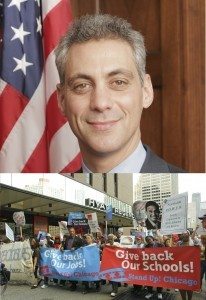

Sometimes you have to just love the California state constitution. It may right now be the one thing protecting us from the chaos inflicted on Chicago, where the largest mass closure of public schools in U.S. history is underway.
You might remember when Antonio Villaraigosa was first elected Mayor of Los Angeles. One of his first ambitions was to become the decision-maker over the L.A. Unified School District, to once-and-for-all improve the city’s schools. He wanted to have the power of other big-city mayors like Chicago’s Emanuel and Bloomberg in New York, mayors who now appoint their school boards and their school superintendents.
These two men, with scant education experience, were sure they could do better than life-long educational professionals. They had been elected to run their cities, not their cities’ schools. But, hey, ambition knows no limits. And with the backing of the multimillionaires of the Gates, Broad and Walton foundations,
» Read more about: School Daze: The Attack on Public Education Continues »


It’s not every day that L.A. voters are given the chance to hear a range of the city’s political candidates explain their positions on vital issues in a daylong, in-depth forum. But that’s exactly what’s being offered Monday April 1 for Angelenos who are eager to learn what their potential leaders believe in.
Join Climate Resolve, LAANE and scores of other environmental and community organizations for a candidate forum on April 1. Candidates for Los Angeles City Council, City Controller and City Attorney will outline their positions on key issues regarding the environment, transportation, and jobs.
This is an exclusive chance to understand each candidate’s position on the critical, far-reaching issues that will determine how Los Angeles will address the challenges ahead.
WHEN: Monday, April 1, 9:00am – 4:00pm. You can attend some or all of the discussions.
WHERE: Yosemite Hall at the California Endowment,
» Read more about: L.A. Candidate Forum on the Environment, Transportation and Economy »


We’re still legislating and regulating private morality, while at the same time ignoring the much larger crisis of public morality in America.
In recent weeks Republican state legislators have decided to thwart the Supreme Court’s 1973 decision in “Roe v. Wade,” which gave women the right to have an abortion until the fetus is viable outside the womb, usually around 24 weeks into pregnancy.
Legislators in North Dakota passed a bill banning abortions after six weeks or after a fetal heart beat had been detected, and approved a fall referendum that would ban all abortions by defining human life as beginning with conception. Lawmakers in Arkansas have banned abortions within twelve weeks of conception.
The morality brigade worries about fetuses, but not what happens to children after they’re born. They and other conservatives have been cutting funding for child nutrition, healthcare for infants and their mothers, and schools.
An ounce of prevention is worth a pound of cure. A stitch in time saves nine. One dollar spent on contraception saves three on pregnancy and newborn care, and that is just the beginning.
Nationally, we spend 11 billion taxpayer dollars a year on unintended pregnancies. But who’s counting? Automatic cuts built into the sequester slashed $86 million from family planning and reproductive health care for poor women. But that is not enough for Congressional Republicans, who are trying yet again to roll back the contraceptive mandate. If there ever was an indication that they are more interested in ideology than balanced budgets, this is it.
Research published this fall showed that effective, affordable, accessible contraception dramatically drops the rate of unintended pregnancy and related public health costs. In the study, whose co-author explained that it was essentially designed to mimic what Obamacare would have provided,
» Read more about: Contraceptive Mandate: Another Budget Hostage »


Even as the new documentary A Place at the Table highlights in heart-wrenching fashion the plight of 16 million U.S. children who don’t know where their next meal is coming from, some want to end a safety net that for decades has stood between some kids and a slow death from malnutrition – the school meal program. Think starvation can’t happen here, in one of the richest countries on earth? Think again. Not only could U.S. children starve without school meals, but not all that long ago, they did.
Terence Jeffrey, editor in chief of CNSnews.com, argues in an article entitled “Sixty-four Percent of Schoolchildren Fed on Federal Subsidies” that the federal school lunch program is “a weapon liberals employ in their war against the family.” This bizarre idea is based on data he presents which allegedly show a correlation between the increasing number of children eating government subsidized school meals since 1969,
» Read more about: Reporting on Hunger in Schools: Let Them Eat “Balance” »


After the sequester cut teaching jobs, Head Start spots, senior food programs and access to nutrition assistance for over half a million women and their families, the GOP revealed its brand new short-term budget bill for 2013. Buried on page 221 is a curious clause banning federal funding to ACORN, an anti-poverty group.
The clause reads, “None of the funds made available in this Act may be distributed to the Association of Community Organizations for Reform Now (ACORN) or its subsidiaries or successors.”
But ACORN is long dead. Republican and right wing activists helped kill it in 2009 by smearing it with a video falsely edited to be deliberately misleading and stampeding the Democrats into a bill that stripped ACORN of all federal funds.
The bill that defunded ACORN in 2009 was broader – applying to “any organization” that has been charged with breaking federal or state election laws,
» Read more about: Congress Still Punishes ACORN & Rewards Amgen’s Fraud »

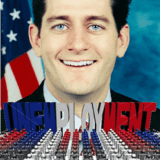
“Our biggest problems over the next 10 years are not deficits,” the President told House Republicans Wednesday, according to those who attended the meeting.
The President needs to deliver the same message to the public, loudly and clearly. The biggest problems we face are unemployment, stagnant wages, slow growth and widening inequality — not deficits. The major goal must be to get jobs and wages back, not balance the budget.
Paul Ryan’s budget plan — essentially, the House Republican plan — is designed to lure the White House and Democrats, and the American public, into a debate over how to balance the federal budget in 10 years, not over whether it’s worth doing.
“This is an invitation,” Ryan explained when he unveiled the plan Tuesday. “Show us how to balance the budget. If you don’t like the way we’re proposing to balance our budget, how do you propose to balance the budget?”
Until now the President has seemed all too willing to engage in that debate.


Let the hand-wringing begin! In last week’s primary election, just over 16 percent of Los Angeles voters turned out at the polls, less than four years ago, which was less than the election before that, which was less than the election before that – and on and on. In Southern California municipalities – big city or small – elections draw about 20 percent of the vote. This is a problem in a democracy.
Low turnouts mean that more and more money gets spent on fewer and fewer voters, and when only a small minority of voters go to the polls, elected officials make major policy decisions based on a narrower group of constituents. In a democratic society, where people are empowered to make decisions that affect their lives, fewer voters mean diminished participation and less accountability.
In the early 1980s, when reformers first took a majority of seats on the City Council in Santa Monica,
» Read more about: Diminishing Returns: Where Have All the Voters Gone? »


I don’t know if Senate Minority Leader Mitch McConnell or House Speaker John Boehner read much history.
But this old history teacher wonders if the GOP’s stubborn refusal to seriously negotiate with the Democrats over the sequester cuts is more cribbing from Andy Jackson’s 1824 political playbook.
That year, Old Hickory lost the presidency to John Quincy Adams. Immediately, Jackson set out to make Adams a one-termer.
Jackson sent the word to pro-Jackson members of Congress: If Adams is for it, oppose it. If he’s against it, support it.
Jackson unseated Adams in 1828.
No sooner was Barack Obama elected president in 2008 than McConnell said the GOP’s top political priority was beating him in 2012. “Amens” rose from Boehner and the rest of the party. GOP lawmakers got their marching orders: If Obama’s for it, we’re not, and vice versa.
» Read more about: History Games: The Sequester as Punishment »


If you watched any one of the recent Los Angeles mayoral debates, you likely concluded that the biggest issue in this election is who voters can trust to get the city’s fiscal house in order.
But what does it really mean to be a good fiscal watchdog in the city of Los Angeles? As a long-time city commissioner and community leader, I have found that the biggest demonstration of strong leadership is the willingness to stand up to the powerful corporate interests and their lobbyists, who continue to dominate most of the decisions made at City Hall.
In 2012, “clients” spent more than $35 million on lobbyists hired to influence City Hall decision-makers. For-profit corporations accounted for more than $31 million of that. Unions spent less than $700,000 on paid lobbyists. The list of companies paying lobbyists to represent their interests at City Hall is a Who’s Who of corporate America.
» Read more about: Our Next Mayor Must Stand Up to Corporate Lobbyists »
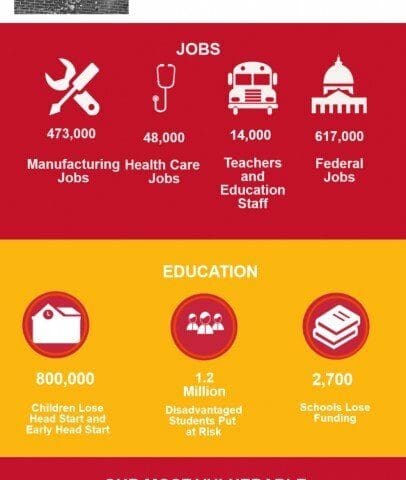
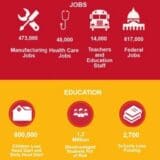
(This article, which first appeared on Equal Voice, includes information from Equal Voice News reporter Kathy Mulady and Associated Press writers Nedra Pickler, Jim Kuhnhenn and Stephen Ohlemacher. Please see Equal Voice’s infographic at the end of this post. Republished with permission.)
Unless sequestration is stopped by an act of Congress, the budget cutting will [contine], reducing funding to thousands of programs that took years to build, and provide a safety net for millions of poor working families.
Under the plan, every dollar approved each year by Congress [will] be slashed by a uniform amount, resulting in at least temporary layoffs for hundreds of thousands of public and private-sector workers. Programs like Medicare and Social Security are exempt, but the slashing of other programs will slow the nation’s fragile economic recovery.
On March 1 automatic cuts of $85 billion from a $3.6 trillion budget [began].
» Read more about: The Sequester: Families and Kids Not on Congress’ Agenda »


We present the following guide to show where three front-running mayoral candidates stand on issues affecting jobs and the local economy. Except as noted, all quotes are drawn from our interviews with the candidates. (Jan Perry did not respond to interview requests.) Please note that Frying Pan News does not endorse candidates.
Issue
Eric Garcetti
Wendy Greuel
Kevin James



Quality Jobs
Most important.
Most important.
Jobs are extremely important but depend on a revitalized business sector.
Quote
“The first thing on my agenda is putting this city back to work, making City Hall work for everybody but then also getting jobs back here — good, middle-class, decent-paying jobs with benefits.”
“I will be the jobs tsar. I will be the person in the city that is going to go out and talk to businesses and encourage them to move to the city of Los Angeles and to grow.”
“We have a shockingly high unemployment rate – it’s 50 percent higher than the national average.
» Read more about: Where Mayoral Candidates Stand on Jobs and the Economy »


“In 1933 we reversed the policy of the previous Administration. For the first time since the Depression you had a Congress and an Administration in Washington which had the courage to provide the necessary resources which private interests no longer had or no longer dared to risk.
This cost money. We knew, and you knew, in March, 1933, that it would cost money. We knew, and you knew, that it would cost money for several years to come. The people understood that in 1933. They understood it in 1934, when they gave the Administration a full endorsement of its policy. They knew in 1935, and they know in 1936, that the plan is working.”—FDR, 1936
Eighty years ago this month, at the height of the worst economic crisis in our nation’s history, Franklin D. Roosevelt delivered on his promise to launch a New Deal for the American people.
» Read more about: The Sequester Puts Humanity Last — FDR Put It First »


Imagine a plot to undermine the government of the United States, to destroy much of its capacity to do the public’s business, and to sow distrust among the population.
Imagine further, that the plotters infiltrate Congress and state governments, reshape their districts to give them disproportionate influence in Washington, and use the media to spread big lies about the government.
Finally, imagine they not only paralyze the government but are on the verge of dismantling pieces of it.
Far-fetched? Perhaps. But take a look at what’s been happening in Washington and many state capitals since Tea Party fanatics gained effective control of the Republican Party, and you’d be forgiven if you see parallels.
Tea Party Republicans are crowing about the “sequestration” cuts beginning today (Friday). “This will be the first significant tea party victory in that we got what we set out to do in changing Washington,” says Rep.
» Read more about: Hostage Crisis: The Sequester and a Tea Party Plot »
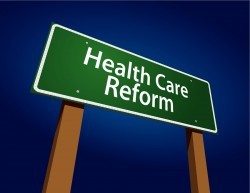

The headlines – “Many States Say ‘No’ to Health Insurance Exchanges,” to take one example – make it seem like bad news. But it’s not. It is good news that half the states are refusing to have anything to do with the new health insurance marketplaces being set up under the Affordable Care Act.
One of the biggest differences between the good version of ObamaCare passed by the House and the mediocre Senate version that became law was the question of whether the federal government or states would run the new health insurance marketplaces (called “exchanges” in the law). But resistance by Republican governors is leading to implementation of the law in a way that is much closer to the vision in the House bill.
The new health marketplaces are the centerpiece of ObamaCare, the mechanisms through which people who don’t get health coverage at work but make too much for Medicaid will be able to purchase subsidized health coverage,
» Read more about: Just Say No to Health Care Marketplaces »